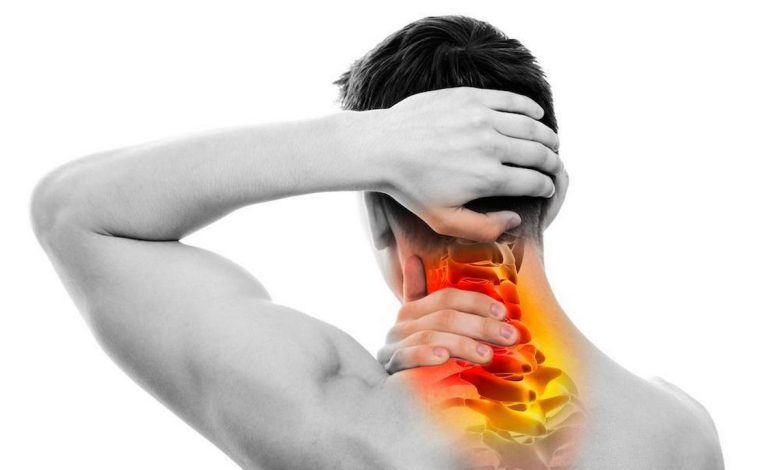Cervical pain, pain in the neck: what is this, causes, symptoms, diagnostics, treatment, prevention

Neck pain; Pain – neck; Neck stiffness; Cervical pain; Whiplash; Stiff neck
Neck pain is a common condition, which affects millions of people every year. It can range from mild to severe and can be caused by a variety of factors.. This may be a symptom of an underlying disease or the result of an injury.. Understanding the reasons, symptoms and treatments for neck pain can help you manage your condition and prevent it from getting worse.
What is neck pain?
Neck pain is a type of pain or discomfort, that occurs in the neck. It can be localized in one area or spread to the entire neck.. Pain can be sharp, dull or throbbing and can range from mild to severe. This can be caused by various factors, including muscle strain, disk problems, arthritis or injury.
Causes of neck pain
Neck pain can be caused by various factors.. Common reasons include:
- Muscle tension: repetitive movements or poor posture can lead to neck muscle strain, which can cause pain and discomfort.
- Problems with intervertebral discs. Discs are the pads between the vertebrae in the spine. When they break or form a hernia, they can cause neck pain.
- Arthritis: arthritis can cause inflammation and pain in the neck and other joints.
- Trauma: Trauma or accident can cause neck injury, which will lead to pain.
- Other causes of neck pain include poor posture, whiplash and spinal stenosis.
Neck pain symptoms
Symptoms of neck pain can vary depending on the underlying cause.. Common symptoms include:
- Pain. Neck pain can be severe, dull or pulsating. It can be localized in one area or spread to the entire neck..
- stiffness: neck pain can cause neck stiffness, making it difficult to move the head or neck.
- Headache: neck pain can cause headaches, which can be sharp or blunt.
- Numbness or tingling: neck pain can cause numbness or tingling in the arms and hands.
When to contact a healthcare professional
If you experience severe or persistent neck pain, you should see a doctor. You should also see a doctor, if you experience any of the following symptoms:
- Numbness or tingling in the arms or hands
- Weakness in the arms or hands
- Severe headaches
- Heat
- Weight loss
Questions, that your doctor may ask
When you see a doctor with neck pain, he will ask you a lot of questions, to determine the cause of your pain. These questions may include:
- Where is the pain?
- How long have you been in pain?
- What activities make the pain worse??
- Does the pain radiate to other areas??
- Have you had any recent injuries or accidents?
- Do you have any other medical conditions?
Diagnosis of neck pain
Your doctor will conduct a physical examination, to diagnose the cause of neck pain.
Tests are only run if, if you have symptoms or a medical history, that suggest the presence of a tumor, infection, fracture or serious nervous breakdown. In this case, the following tests can be carried out:
- X-rays of the neck
- CT scan of the neck or head
- Blood tests, such as complete blood count ( CBC )
- Neck MRI
Neck Pain Treatment
Treatment for neck pain will depend on the underlying cause.. Common treatments include:
- Painkillers: OTC painkillers, such as ibuprofen or acetaminophen, can relieve neck pain.
- Physiotherapy: physical therapy can help strengthen neck muscles and improve posture.
- Surgical intervention: if neck pain is caused by a structural problem, such as a herniated disc, It may require surgical intervention.
Home treatment for neck pain
In addition to medical treatment, there are a number of home treatments, which can help relieve neck pain. These procedures include:
- Recreation: rest can help reduce neck pain.
- Ice and heat: applying ice or heat to the neck can help reduce pain and inflammation.
- Exercises: gentle stretching and strengthening exercises can help improve posture and reduce neck pain.
- good posture. Correct posture can help reduce neck pain.
Prevention of neck pain
There are a number of steps, you can take, to prevent neck pain. These steps include:
- Maintain a healthy weight: being overweight can put extra stress on your neck.
- Maintain correct posture: Poor posture can lead to neck pain.
- Exercise regularly. Regular exercise helps strengthen neck muscles and improve posture.
- Take breaks: frequent breaks in activities, associated with repetitive movements, may help reduce the risk of neck pain.
Conclusion
Neck pain is a common condition, which affects millions of people every year. It can be caused by various factors, including muscle tension, disk problems, arthritis and injury.
Understanding the reasons, symptoms and treatments for neck pain can help you manage your condition and prevent it from getting worse. If you experience severe or persistent neck pain, you should see a doctor
. There are a number of treatments for neck pain., including medicines, physiotherapy and surgery.
Besides, there are a number of home procedures and preventive measures, which can help reduce neck pain.
Used sources and literature
Hudgins TH, Origen AK, Pleuhs B, Raise JT. Cervical sprain or strain. In: Frontera WR, Silver JK, Rizzo TD Jr, eds. Essentials of Physical Medicine and Rehabilitation: Musculoskeletal Disorders, Pain, and Rehabilitation. 4th ed. Philadelphia, PA: Elsevier; 2019:chap 6.
Kosty J, Nasser R, Vasquez RA, Wong CC, Cheng JS. Neck pain. In: Firestein GS, Budd RC, Gabriel SE, Koretzky GA, McInnes IB, O'Dell Jr, eds. Firestein & Kelley’s Textbook of Rheumatology. 11th ed. Philadelphia, PA: Elsevier;2021:chap 48.
Donthal m. Arm and neck pain. In: Jankovic J, Mazziotta JC, Pomeroy SL, Newman NJ, eds. Bradley and Daroff’s Neurology in Clinical Practice. 8th ed. Philadelphia, PA: Elsevier; 2022:chap 32.
